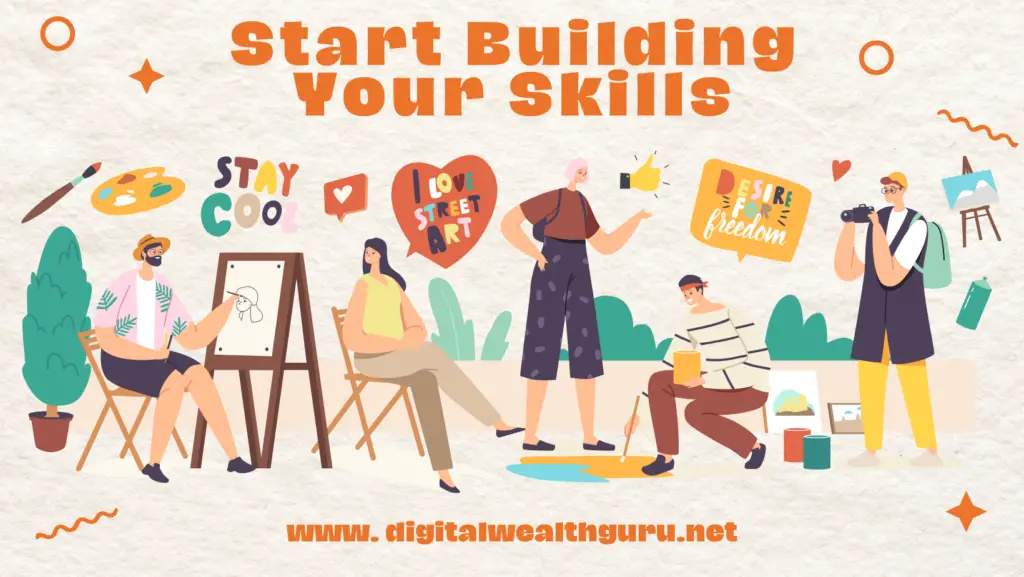The idea to invest for Teenagers might seem daunting, but starting early can set you up for lifelong financial success. This guide will walk you through crucial steps to begin your investing journey from ages 13 to 18. Even if you’re older, you can use this as a checklist to ensure you’re on track. Implementing just a few of these strategies can put you miles ahead of your peers.
Age 13: Open an Investing Account For Teenagers

When it comes to investing, the most critical factor is time in the market. This means you want your money invested for as long as possible so it can grow exponentially, much like a snowball rolling down a hill and turning into an avalanche. If you’re 13 or younger, you have a significant advantage over those who start investing later.
Understanding Time in the Market
The concept of “time in the market” refers to the duration your investments remain invested, allowing compound interest to work its magic. Compound interest means you earn interest not only on your initial investment but also on the interest that accumulates over time. This creates a snowball effect, where your investment grows faster as it continues to compound.
Convincing Your Parents to Open a Custodial Account
At 13, you’re not legally allowed to open an investment account on your own. However, you can ask your parents or guardians to open a custodial account for you. This account is controlled by an adult but benefits you, the minor.
What is a Custodial Account?
A custodial account is an investment account managed by an adult for the benefit of a minor. These accounts have different names depending on where you live. In the UK, it’s known as a junior stocks and shares ISA, while in the USA, it can be a UGMA (Uniform Gifts to Minors Act) or UTMA (Uniform Transfers to Minors Act) account.
Benefits of a Custodial Account
- Early Start: Starting early gives your investments more time to grow.
- Educational Opportunity: Learning about investing at a young age sets you up with valuable financial knowledge.
- Parental Control: Parents manage the account until you reach the age of majority, ensuring responsible investing.
Types of Investments
One of the simplest and most effective ways to invest is through low-cost index funds. These funds track the performance of a specific index, like the S&P 500, which includes 500 of the largest public companies in the USA. This diversification reduces risk, as your money is spread across many companies.
Why Index Funds?
- Diversification: Your investment is spread across multiple companies, reducing risk.
- Low Fees: Index funds typically have lower fees compared to actively managed funds.
- Historical Performance: The S&P 500 has historically provided an average annual return of around 10-12%.
Practical Steps to Open an Account
- Discuss with Your Parents: Explain the benefits of starting early and show them resources or articles on the power of compound interest.
- Choose a Brokerage: Select a reputable brokerage like Vanguard or Fidelity, known for low fees and a range of investment options.
- Open a Custodial Account: Your parent or guardian will need to provide their details and yours to set up the account.
- Start Investing: Begin with a small amount, perhaps money received from birthdays or chores, and invest in a low-cost index fund.
Maintaining Your Account
Once the account is open, it’s essential to stay involved and learn as much as possible about investing. Here are some tips:
- Regular Contributions: Try to add to your investments regularly, even if it’s a small amount.
- Stay Informed: Read books, watch videos, and follow news about the stock market to enhance your understanding.
- Review Your Investments: Periodically check your account to see how your investments are performing.
Future Management
In the UK, you can start managing your junior stocks and shares ISA at age 16 and withdraw money from age 18. However, the longer you keep your investments, the more they can grow. In the USA, control of UGMA/UTMA accounts typically transfers to the minor when they reach adulthood, which varies by state.
Starting to invest at age 13 can set you up for significant financial success. By understanding the importance of time in the market, convincing your parents to open a custodial account, and choosing the right investments, you can harness the power of compound interest to grow your wealth. Remember, the key to successful investing is to start early, stay informed, and be patient.
Age 14: Discover Your Talent As a Teenager

Discovering your talent at a young age can set the foundation for a fulfilling and successful future. Whether you’re passionate about art, sports, science, or anything else, identifying and nurturing your talent can open doors to endless opportunities. Here’s a comprehensive guide to help you find and develop your talent at age 14.
Understanding the Importance of Finding Your Talent
Finding your talent is not just about excelling in a specific area; it’s about discovering what makes you happy and motivated. When you engage in activities you enjoy, you’re more likely to put in the effort and time needed to excel. This can lead to a sense of accomplishment and increased self-confidence.
Benefits of Discovering Your Talent Early
- Personal Fulfillment: Engaging in activities you love brings joy and satisfaction.
- Skill Development: The earlier you start, the more time you have to hone your skills.
- Career Opportunities: Identifying your talent can guide your educational and career choices.
- Social Connections: Pursuing your interests can help you meet like-minded people and build lasting friendships.
Steps to Discover Your Talent
- Explore Different Activities: At 14, you have the freedom to try various activities. Join clubs, take classes, and participate in extracurricular activities to see what interests you.
- Sports: Try out for different sports teams to see if you have a knack for athletics.
- Arts: Experiment with drawing, painting, music, or theater to discover your creative side.
- Academics: Dive into subjects like science, math, literature, or history to see if you have a passion for learning.
- Technology: Explore coding, robotics, or gaming to see if you have an interest in tech-related fields.
- Reflect on Your Interests: Think about the activities that make you lose track of time or the subjects you enjoy reading about. These are often indicators of your natural talents.
- Keep a Journal: Write down your thoughts and experiences as you try new activities. Note which ones make you feel excited and motivated.
- Seek Feedback: Ask friends, family, and teachers for their observations. Sometimes, others can see your strengths more clearly than you can.
- Take Talent Assessments: There are various online quizzes and assessments designed to help you identify your strengths and interests. These can provide valuable insights and point you in the right direction.
- Set Goals: Once you’ve identified potential talents, set short-term and long-term goals to develop them. This could include taking advanced classes, participating in competitions, or dedicating a certain amount of time each week to practice.
Nurturing Your Talent
- Practice Regularly: Consistent practice is key to improving any skill. Set aside time each day or week to work on your talent.
- Create a Schedule: Plan your practice sessions and stick to them. Consistency is more important than intensity.
- Track Progress: Keep a record of your improvements and milestones. This will motivate you to keep going.
- Seek Guidance: Find mentors or coaches who can provide valuable feedback and guidance. This could be a teacher, a coach, or an experienced professional in your field of interest.
- Participate in Competitions and Events: Entering competitions or showcasing your talent in events can boost your confidence and provide valuable experience.
- Stay Open to Learning: Continuously seek new knowledge and skills related to your talent. Attend workshops, read books, watch tutorials, and stay updated with the latest trends in your field.
- Balance and Well-being: While it’s important to focus on developing your talent, ensure you maintain a balance with other aspects of your life, including academics, social activities, and self-care.
Examples of Talents and How to Develop Them
- Artistic Talent: If you have a flair for drawing or painting, consider taking art classes, visiting museums, and practicing different techniques. Join an art club or participate in local art fairs.
- Musical Talent: If you love playing an instrument or singing, find a music teacher, join a band or choir, and perform at school events or local venues.
- Athletic Talent: If you’re good at sports, join school teams, attend sports camps, and practice regularly. Competing in local or national tournaments can also help you gain exposure.
- Academic Talent: If you excel in academics, join academic clubs, participate in competitions like math or science Olympiads, and seek advanced coursework or enrichment programs.
- Technological Talent: If you’re interested in technology, join coding clubs, take online courses, and work on personal projects or internships to gain practical experience.
Finding your talent at age 14 is an exciting journey that can lead to personal fulfillment and future success. By exploring different activities, reflecting on your interests, seeking guidance, and consistently practicing, you can discover and nurture your unique abilities. Remember, the key is to stay curious, open-minded, and dedicated to developing your talent.
Age 15: Stash Your Money

At 15, you’re probably earning some money from part-time jobs, allowances, or gifts. It’s crucial to start developing good saving and investing habits to build a solid financial foundation. This guide will help you understand the importance of saving and provide practical steps to manage your money wisely.
Understanding the Importance of Saving
Saving money is the first step towards financial independence. By setting aside a portion of your earnings, you prepare for future expenses, emergencies, and investment opportunities. Here’s why saving is essential:
- Financial Security: Having savings gives you a safety net for unexpected expenses, such as medical emergencies or urgent purchases.
- Opportunity Fund: Savings enable you to take advantage of opportunities, such as starting a business, buying a car, or funding your education.
- Future Investments: Money saved today can be invested in the future, leading to potential growth through compound interest.
Creating a Savings Plan
To effectively stash your money, you need a plan. Here are the steps to create a solid savings plan:
- Set Clear Goals: Define what you’re saving for, whether it’s a specific purchase, college, or an emergency fund. Having clear goals will motivate you to save consistently.
- Determine Your Income: Calculate how much money you receive from part-time jobs, allowances, or other sources. Understanding your income will help you plan your savings better.
- Create a Budget: Allocate your income to different categories, such as savings, spending, and investing. A budget ensures you live within your means while saving for the future.
Practical Saving Tips for Teenagers
- Save a Percentage of Your Income: Aim to save at least 20% of your earnings. If you earn $100 from a part-time job, save $20 and use the rest for spending and other expenses.
- Open a Savings Account: If you haven’t already, open a savings account. Look for accounts with no fees and good interest rates. Many banks offer special accounts for teenagers with lower minimum balance requirements.
- Use a Piggy Bank or Envelope System: For smaller amounts, use a piggy bank or envelope system to physically separate your savings. This method can help you visualize your progress and resist the temptation to spend.
Making Saving Fun
Saving money doesn’t have to be boring. Here are some creative ways to make saving enjoyable:
- Set Up Savings Challenges: Challenge yourself to save a specific amount each week or month. Turn it into a game by rewarding yourself when you reach your goals.
- Track Your Progress: Use a savings tracker or app to monitor your savings. Watching your savings grow can be motivating and encourage you to save more.
- Join a Savings Group: Find friends or family members who also want to save money. Share your goals and progress, and support each other in staying disciplined.
Starting to Invest Small Amounts
As you build your savings, consider setting aside a portion for investments. Even small amounts can grow significantly over time. Here are some beginner-friendly investment options:
- Robo-Advisors: Platforms like Betterment or Wealthfront offer automated investing with low fees. They create diversified portfolios based on your risk tolerance and investment goals.
- Micro-Investing Apps: Apps like Acorns and Stash allow you to invest small amounts of money, even spare change from everyday purchases. These apps round up your transactions and invest the difference.
- High-Interest Savings Accounts: Some savings accounts offer higher interest rates, helping your money grow faster without the risk associated with investing in stocks.
Building Good Financial Habits
- Avoid Impulse Spending: Before making a purchase, ask yourself if it’s a need or a want. Delaying gratification can help you save more.
- Learn About Personal Finance: Read books, watch videos, and follow blogs about personal finance. The more you learn, the better equipped you’ll be to make smart financial decisions.
- Review Your Budget Regularly: Regularly check your budget to ensure you’re on track with your savings goals. Adjust your budget as needed based on changes in your income or expenses.
At age 15, stashing your money is a crucial step towards financial independence. By understanding the importance of saving, creating a savings plan, and exploring beginner investment options, you can build a strong financial foundation. Remember, the habits you develop now will shape your financial future. Start saving today and enjoy the benefits of financial security and opportunities in the years to come.
Age 16: Start Building Your Skills as a Teenager

At age 16, you have a unique opportunity to start building the skills and experiences that will set you up for financial and personal success. This is a crucial time to focus on learning, gaining practical experience, and refining your abilities. Here’s a detailed guide on how to hone your skills at this pivotal age:
Identify Your Interests and Passions
- Self-Assessment: Take some time to reflect on what you enjoy doing and what you’re good at. This can help you identify potential career paths or areas where you can excel.
- Explore Different Fields: Don’t be afraid to try new things. Join clubs, take elective classes, or participate in community activities to explore various interests.
- Seek Feedback: Talk to teachers, mentors, and family members to get their perspective on your strengths and areas for improvement.
Academic Excellence
- Focus on Core Subjects: Ensure you have a strong grasp of essential subjects like math, science, and language arts. These are foundational for many career paths.
- Advanced Courses: If possible, enroll in Advanced Placement (AP) or International Baccalaureate (IB) courses to challenge yourself and gain college credits.
- Study Habits: Develop effective study habits and time management skills to excel academically. This includes setting a study schedule, minimizing distractions, and seeking help when needed.
Practical Skills Development
- Technical Skills: Depending on your interests, learn technical skills such as coding, graphic design, video editing, or any other relevant skills. Many free online resources and courses are available.
- Soft Skills: Develop essential soft skills such as communication, teamwork, problem-solving, and leadership. These are valuable in any field and will help you in personal and professional settings.
- Financial Literacy: Learn the basics of personal finance, including budgeting, saving, and investing. Understanding how to manage money effectively is crucial for long-term success.
Gain Work Experience
- Part-Time Jobs: Look for part-time jobs or internships in areas that interest you. This provides practical experience, helps you build a work ethic, and can be a great addition to your resume.
- Volunteer Work: Volunteering is an excellent way to gain experience, develop new skills, and give back to your community. It also looks great on college applications and resumes.
- Entrepreneurial Ventures: Consider starting a small business or side hustle. This can teach you valuable lessons about entrepreneurship, marketing, customer service, and financial management.
Networking and Mentorship
- Build a Network: Start building a network of contacts in fields you’re interested in. Attend events, join online communities, and connect with professionals on platforms like LinkedIn.
- Seek Mentors: Find mentors who can provide guidance, advice, and support. This could be a teacher, a family friend, or a professional in your field of interest.
- Peer Learning: Collaborate with peers who share similar interests. Group study sessions, projects, or co-curricular activities can enhance your learning experience.
Extracurricular Activities
- Join Clubs and Organizations: Participate in school clubs, sports teams, or community organizations. This helps you develop teamwork and leadership skills while pursuing your interests.
- Competitions and Challenges: Enter competitions or challenges related to your interests, such as science fairs, coding competitions, or debate tournaments. These experiences can be highly rewarding and motivating.
- Creative Pursuits: Engage in creative activities like writing, art, music, or drama. Creativity is a valuable skill that can enhance problem-solving and critical thinking abilities.
Prepare for the Future
- Career Exploration: Research different career options and the education or training required for each. This will help you make informed decisions about your future.
- College and Scholarship Applications: Start researching colleges, universities, and scholarship opportunities. Understand the requirements and deadlines to ensure you’re well-prepared.
- Goal Setting: Set short-term and long-term goals for your education, career, and personal development. Having clear goals will help you stay focused and motivated.
At age 16, honing your skills is about exploring your interests, gaining practical experience, and developing both technical and soft skills. By focusing on academics, seeking work and volunteer opportunities, building a network, participating in extracurricular activities, and preparing for your future, you can set yourself up for success in whatever path you choose.
This is a time to be proactive, curious, and ambitious, laying the groundwork for a fulfilling and prosperous future.
Age 17: Pass Your Driving Test

Getting your driver’s license at 17 is a significant milestone that brings a new level of independence and responsibility. It can open up many opportunities, from being able to commute to work or school to taking road trips with friends. This guide will walk you through the steps to pass your driving test, from obtaining a learner’s permit to preparing for both the written and practical exams.
Obtaining a Learner’s Permit
Before you can take your driving test, you need to get a learner’s permit. The requirements for obtaining a permit vary by location, but the general process is similar in most places.
Steps to Obtain a Learner’s Permit
- Check Eligibility: Ensure you meet the minimum age requirement, usually around 16, though this can vary.
- Gather Necessary Documents: You’ll typically need proof of identity, residency, and possibly school enrollment or attendance.
- Pass a Written Test: This test assesses your knowledge of road signs, traffic laws, and safe driving practices. Study using your state’s driver’s manual and practice tests available online.
- Complete Vision Test: You’ll need to demonstrate that your vision meets the minimum standards for driving.
- Pay the Fee: There is usually a fee for the learner’s permit application.
Preparing for the Written Test
The written test is an essential part of the process to get your learner’s permit. Here are some tips to prepare effectively:
- Study the Driver’s Manual: This manual covers all the rules and regulations you’ll need to know. Read it thoroughly.
- Take Practice Tests: Many websites offer free practice tests that mimic the format and content of the actual exam. Use these to gauge your understanding and identify areas where you need more study.
- Attend Driver’s Education Classes: Some schools offer driver’s education courses that include classroom instruction on traffic laws and safe driving practices.
Behind-the-Wheel Training
Once you have your learner’s permit, you’ll need to gain practical driving experience. This involves both professional instruction and practice with a licensed adult.
Steps for Effective Behind-the-Wheel Training
- Enroll in a Driving School: Professional instructors can provide valuable lessons and help you develop safe driving habits.
- Practice Regularly: Spend time driving with a parent or guardian in a variety of conditions (day, night, rain, highway, etc.) to build your confidence and skills.
- Keep a Log: Many states require a certain number of supervised driving hours. Keep a log to track your progress and ensure you meet the requirements.
Preparing for the Practical Driving Test
The practical driving test assesses your ability to operate a vehicle safely and follow traffic laws. Here’s how to prepare:
- Understand the Test Requirements: Know what the test will cover, such as parallel parking, three-point turns, and obeying traffic signals.
- Take Practice Tests: Some driving schools offer mock driving tests to simulate the real thing. These can help you get comfortable with the format and reduce test-day anxiety.
- Review Common Mistakes: Learn about common errors that lead to failure and practice avoiding them.
- Ensure Your Car is Test-Ready: Make sure the vehicle you use for the test is in good condition, with all lights, signals, and brakes working properly.
Test Day Tips
On the day of your test, follow these tips to increase your chances of success:
- Get Plenty of Rest: Make sure you’re well-rested and alert.
- Arrive Early: Give yourself plenty of time to get to the testing site, so you’re not rushed.
- Stay Calm: Take deep breaths to manage nerves. Remember, you’ve prepared well for this.
- Listen Carefully: Pay close attention to the examiner’s instructions and follow them precisely.
- Drive Confidently: Trust in your training and experience. Drive as you normally would, following all rules and safety practices.
After Passing Your Test
Congratulations! Once you’ve passed your driving test and received your license, it’s important to continue developing your driving skills and maintaining a clean driving record.
Responsibilities of a New Driver
- Follow Traffic Laws: Adhere to all traffic laws and signals.
- Avoid Distracted Driving: Stay focused on the road. Avoid using your phone or engaging in other distractions while driving.
- Drive Defensively: Be aware of other drivers and anticipate potential hazards.
- Maintain Your Vehicle: Keep your car in good working condition with regular maintenance.
Benefits of Having a Driver’s License
- Independence: Gain the freedom to go where you want, when you want.
- Employment Opportunities: Access jobs that require a driver’s license or involve commuting.
- Social Engagement: More easily participate in social activities and events.
- Life Skills: Develop responsibility and time management through driving.
Passing your driving test at 17 is a pivotal step towards greater independence and responsibility. By understanding the requirements, preparing thoroughly for both the written and practical tests, and practicing safe driving habits, you can achieve this important milestone.
Remember, driving is a privilege that comes with significant responsibilities. Always prioritize safety and continue to improve your skills as you gain more experience on the road.
Age 18: Key Steps to Financial Independence

Reaching the age of 18 is a significant milestone that brings new responsibilities and opportunities, especially in the realm of personal finance. At this age, you have the legal capacity to make financial decisions and take control of your economic future. Here are key steps to achieving financial independence at 18.
1. Open a Bank Account
One of the first steps towards financial independence is opening your own bank account. If you don’t already have one, here’s how to go about it:
- Choose the Right Bank: Research different banks and credit unions to find one that offers low fees, good interest rates, and convenient services.
- Types of Accounts: Open a checking account for daily transactions and a savings account for setting aside money. Many banks offer student accounts with special perks.
- Set Up Online Banking: Ensure your account has online and mobile banking options for easy access and management of your finances.
2. Create a Budget
A budget is essential for managing your money and achieving financial goals. Here’s how to create an effective budget:
- Track Your Income and Expenses: Record all sources of income and categorize your expenses (e.g., rent, food, transportation, entertainment).
- Set Financial Goals: Define short-term and long-term financial goals, such as saving for a car, college, or an emergency fund.
- Allocate Funds: Assign portions of your income to each expense category and make adjustments to ensure you’re not spending more than you earn.
- Use Budgeting Tools: Consider using budgeting apps like Mint, YNAB (You Need A Budget), or a simple spreadsheet to keep track of your finances.
3. Build an Emergency Fund
An emergency fund is a financial safety net that can cover unexpected expenses, such as medical bills or car repairs. Here’s how to start one:
- Set a Target Amount: Aim to save at least three to six months’ worth of living expenses.
- Start Small: Begin with a manageable amount, such as $500, and gradually increase it.
- Automate Savings: Set up automatic transfers from your checking account to your savings account to build your fund consistently.
4. Understand and Build Credit
Building a good credit history is crucial for future financial opportunities, such as obtaining loans or renting an apartment. Here’s how to start:
- Get a Credit Card: Apply for a student credit card or a secured credit card if you have no credit history.
- Use Credit Responsibly: Charge small amounts that you can pay off in full each month to avoid interest and build a positive credit history.
- Monitor Your Credit Score: Regularly check your credit report for errors and track your credit score. Services like AnnualCreditReport.com provide free credit reports annually.
5. Start Investing
Investing is key to growing your wealth over time. Here’s how to get started:
- Open an Investment Account: If you haven’t already, open a brokerage account. Many platforms, such as Robinhood, E*TRADE, or Fidelity, offer user-friendly options for beginners.
- Choose Investments Wisely: Consider starting with low-cost index funds or exchange-traded funds (ETFs) that provide diversification.
- Learn About Different Investments: Educate yourself on stocks, bonds, mutual funds, and other investment vehicles. Resources like Investopedia and financial books can be helpful.
6. Consider Further Education or Skill Development
Investing in your education and skills can significantly impact your earning potential. Here’s what to consider:
- Higher Education: If you’re attending college, focus on your studies and consider part-time work to gain experience and earn money.
- Vocational Training: If college isn’t for you, explore vocational training or certification programs in fields with high demand, such as healthcare, technology, or skilled trades.
- Online Courses: Platforms like Coursera, Udemy, and Khan Academy offer affordable courses to develop new skills.
7. Find a Stable Income Source
Securing a reliable source of income is essential for financial independence. Here’s how to approach it:
- Part-Time or Full-Time Job: Depending on your schedule and needs, find a part-time or full-time job that aligns with your career goals.
- Freelancing: If you have skills in areas like writing, graphic design, or programming, consider freelancing as a flexible income source.
- Entrepreneurship: If you have a business idea, explore entrepreneurship. Start small and scale up as you gain experience and resources.
8. Manage Debt Wisely
Debt can hinder your financial independence if not managed properly. Here’s how to handle it:
- Student Loans: If you have student loans, understand the repayment terms and explore options like income-driven repayment plans.
- Credit Card Debt: Avoid carrying high balances on credit cards. Pay off your balance in full each month to avoid interest charges.
- Avoid Unnecessary Debt: Be cautious about taking on new debt. Only borrow what you can afford to repay.
9. Learn About Taxes
Understanding taxes is crucial as you start earning money. Here’s what you need to know:
- Filing Taxes: Learn how to file your taxes. You may need to file a tax return if you earn above a certain threshold.
- Tax Deductions and Credits: Research deductions and credits you may be eligible for, such as education credits or student loan interest deductions.
- Use Tax Software: Consider using tax software or consulting with a tax professional to ensure you’re filing correctly and maximizing your refund.
10. Seek Financial Advice
Finally, don’t hesitate to seek advice from financial professionals. Here’s how to find help:
- Financial Advisors: A financial advisor can help you create a comprehensive financial plan tailored to your goals.
- Mentors: Seek out mentors who have experience in finance and can provide guidance and support.
- Educational Resources: Continuously educate yourself through books, podcasts, and reputable financial websites.
Achieving financial independence at 18 involves a combination of education, discipline, and strategic planning. By following these key steps—opening a bank account, creating a budget, building an emergency fund, understanding credit, starting to invest, focusing on education, finding stable income, managing debt, understanding taxes, and seeking financial advice—you can set yourself on a path to financial security and success.
Conclusion: How to Invest for Teenagers
By following these steps from ages 13 to 18, you can set yourself up for financial success and independence. Start early, stay disciplined, and leverage every opportunity to grow your wealth and skills. Whether you’re a teenager or older, these strategies can help you achieve your financial goals.
Discover more from Digital Wealth Guru
Subscribe to get the latest posts sent to your email.










Comments